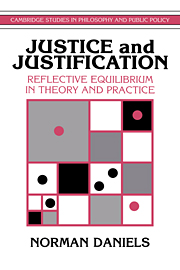Book contents
- Frontmatter
- Contents
- Preface
- 1 Introduction: Reflective equlibrium in theory and practice
- PART I
- PART II
- 9 Health-care needs and distributive justice
- 10 Equality of what: Welfare, resources, or capabilities?
- 11 Determining “medical necessity” in mental health practice, with James E. Sabin
- 12 The prudential life-span account of justice across generations
- 13 Problems with prudence
- 14 Merit and meritocracy
- 15 Rationing fairly: Programmatic considerations
- 16 Wide reflective equilibrium in practice
- Index
9 - Health-care needs and distributive justice
Published online by Cambridge University Press: 01 February 2010
- Frontmatter
- Contents
- Preface
- 1 Introduction: Reflective equlibrium in theory and practice
- PART I
- PART II
- 9 Health-care needs and distributive justice
- 10 Equality of what: Welfare, resources, or capabilities?
- 11 Determining “medical necessity” in mental health practice, with James E. Sabin
- 12 The prudential life-span account of justice across generations
- 13 Problems with prudence
- 14 Merit and meritocracy
- 15 Rationing fairly: Programmatic considerations
- 16 Wide reflective equilibrium in practice
- Index
Summary
WHY A THEORY OF HEALTH–CARE NEEDS?
A theory of health-care needs should serve two central purposes. First, it should illuminate the sense in which we - at least many of us - think health care is “special,” that it should be treated differently from other social goods. Specifically, even in societies in which people tolerate (and glorify) significant and pervasive inequalities in the distribution of most social goods, many feel there are special reasons of justice for distributing health care more equally. Some societies even have institutions for doing so. To be sure, others argue it is perverse to single out health care in this way, or that if we have reasons for doing so, they are rooted in charity, not justice. But in any case, a theory of health-care needs should show their connection to other central notions in an acceptable theory of justice. It should help us see what kind of social good health-care is by properly relating it to social goods whose importance is similar and for which we may have a clearer grasp of appropriate distributive principles.
Second, such a theory should provide a basis for distinguishing the more from the less important among the many kinds of things health care does for us. It should tell us which health-care services are “more special” than others. Thus, a broad category of health-services functions to improve quality of life, not to extend or save it.
- Type
- Chapter
- Information
- Justice and JustificationReflective Equilibrium in Theory and Practice, pp. 179 - 207Publisher: Cambridge University PressPrint publication year: 1996
- 5
- Cited by



